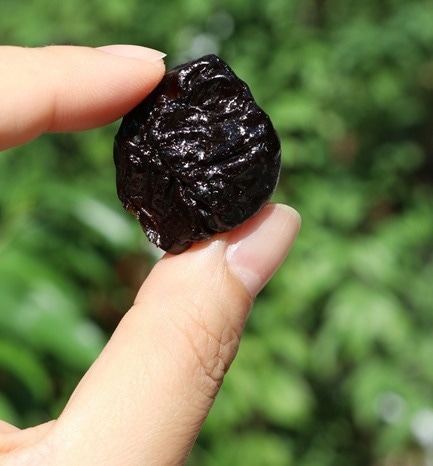A newly published study among 18- to 25-year-old women shows that eating about a serving of prunes daily for a year may be a safe and inexpensive solution to reduce the risk of bone loss associated with oral contraception use. The study was published in the September issue of Current Developments in Nutrition, an American Society of Nutrition publication.
 California Prunes. Image Credit: California Prune Board
California Prunes. Image Credit: California Prune Board
Specifically, findings show that bone mineral density at the ultradistal radius increased significantly among women taking oral contraceptives (OC) plus 50 grams of prunes daily over 12 months. The ultradistal radius is an area especially rich in trabecular bone, which is not solid but is full of holes connected by thin rods and plates of bone tissue.
“Trabecular bone is particularly important for bone health, since skeletal sites with more trabecular bone are those that are most prone to fracture due to osteoporosis,” said Dr. Shirin Hooshmand, PhD, RD, Primary Investigator, San Diego State University.
While the reasons for the “prune effect” aren’t completely understood, research suggests that the effects of prunes occur primarily through inhibition of bone resorption by reducing the activity of osteoclasts, a type of bone cell that breaks down bone tissue.
“As a nutrient-rich fruit, prunes have a combination of minerals, vitamin K, phenolic compounds and fiber that is unique among foods and is important for bone integrity,” Hooshmand said.
According to 2024 figures from the National Institutes of Health, approximately 25 percent of U.S. women aged 15 to 44 who currently use contraception reported using the pill as their method of choice. In the UK, 2022 figures reveal that 17 percent of women aged between 15 and 49 years used the pill as the main method of contraception. Research has shown that the use of OC can be detrimental to bone health density particularly in younger women.
The new study’s findings expand upon a growing body of research investigating prunes’ effects on bone health. For example, the Prune Study, a 12-month randomized controlled trial conducted with 183 postmenopausal women aged 55 to 75, showed similar bone benefits with daily prune consumption of 50 grams, which is about one serving.
Now, in addition to findings among postmenopausal women, our study helps begin to round out the prune-bone health effect story to include younger women with increased risk for bone loss.”
Dr. Shirin Hooshmand, PhD, RD, Primary Investigator, San Diego State University
Source:
Journal reference:
DeMasi, T., et al. (2024). Prunes May Blunt Adverse Effects of Oral Contraceptives on Bone Health in Young Adult Women: A Randomized Clinical Trial. Current Developments in Nutrition. doi.org/10.1016/j.cdnut.2024.104417.